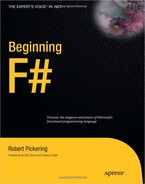In 2003 I was looking for a way to process IL—the intermediate language into which all .NET languages are compiled. At the time, .NET was fairly new and there weren't a lot of options for doing this. I quickly realized that the best option was an API called Abstract IL, AbsIL for short. AbsIL was written in a language called F#, and I decided to use this language to write a small wrapper around AbsIL so I could extract the information I needed from a DLL in a form more usable than with C#. But a funny thing happened while writing the wrapper: even though in those days writing F# was a little hard going as the compiler was far from polished, I found I actually enjoyed programming in F#, so much so that when I finished the wrapper, I didn't want to go back to C#. In short, I was hooked.
During this period, I was working as a consultant, so I needed to regularly check out new technologies and APIs, and I got to do all my experimenting with F#. At the same time, a new way to communicate on the Web was emerging, and a new word was about to enter the English language: blog. I decided I should have a blog because anyone who was any one in technology seemed to have one, so I created strangelight.com, where my blog can still be found today. I later created a wiki about F#, also at strangelight.com, which continues to be very popular.
My job meant I had to do a lot of traveling, so I spent quite a lot of time in hotel rooms or on trains and planes, and I came to view these occasions as time to try out stuff in F#. I ended up exchanging quite a lot e-mails with Don Syme, and eventually we met up. We went for a beer in the pub where Watson and Crick went after they first pieced together the structure of DNA. Will people talk about the pub were Syme and Pickering first met years from now? Errrm, perhaps not. Anyway, all this led me to wonder what I should do with my new-found knowledge of F# and functional programming. About this time, a guy named Jim Huddleston posted to the F# mailing list to ask if anyone would like to write a book about F#. Well, I just couldn't help myself—it sounded like the job for me and in May, 2007, "Foundations of F#" was published.
About half a year later, it was announced that F# would be productized and made available as part of Visual Studio 2010. This seemed too good an opportunity to miss so I signed up to write a new version of the book, with the ambition of documenting the language as it is in Visual Studio 2010. The result is the book you are holding in your hands.
It has been great fun watching F# evolve and turn from a rudimentary language into the fully fledged and highly usable tool you see today. I hope reading this book changes your life as much as writing it changed mine.
